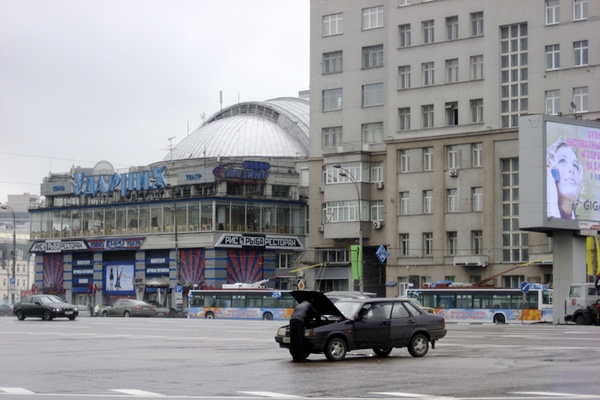The Reason Russia’s such a Problem Is It’s Weak

Moscow 2006
This year Russia celebrates the 100th anniversary of the overthrow of Tsar Nicholas II in the February Revolution and the rise to power of the Bolsheviks in the October Revolution. In addition, the 1905 Revolution weakened the Romanovs and created the first legislature in Russian history. The 1991 Revolution led to the disintegration of the Soviet Union and loss of half of its population.
Yet, even after four 20th century revolutions, Russia has not achieved the modernizing transformations created by the English Revolution (1640s, 1688), American Revolution (1776-1783) and French Revolution (1789-1814).
These revolutions created democracy in Great Britain (1689), the United States (1789) and France (1871). They made England and France leading capitalist powers in the 19th century and the United States the global capitalist leader by 1891. By contrast, Russia still is not a democracy or capitalist power.
The Western revolutions produced a highly literate, politically engaged and aware citizenry. By 1900 the United States had 88% literacy, Great Britain 95% and France 90%. But, Tsarist Russia in 1897 had a 21% literacy rate and only in the 1930s achieved even 50% literacy under Stalinism.
The Western revolutions ended serfdom in the 11th to 14th centuries. They created large cities as centers for capitalism and the arts. Great Britain began the Industrial Revolution in the 1770s and was joined in the 1820s by France and after the Civil War by the United States.
Russia had serfdom to 1861 and afterwards much good land was owned by the landlords to whom debt was owed until 1906. Russia began to industrialize in the 1890s and seriously only in the 1930s. Russia in 1897 was 13% urbanized while Russian big cities were significantly smaller than the Western ones.
England and France became global powers in the 19th century and the United States followed in the early twentieth century. By contrast Russia became a global power after World War II.
The Western powers were protected by natural boundaries and had not been invaded since 1814 (United States) or 1066 (England) while only France was geographically vulnerable.
Russia lacked natural frontiers for defense. Major invasions included the Mongols (1240-1480) and the Polish-Lithuanian Empire (Time of Troubles 1606-1617). The Crimean Tatars in 1571 burned Moscow, Charles XII of Sweden invaded Russia in 1708, France in 1812, Crimean powers in 1853, Japan in 1904 and Germany in 1915 and 1941.
Unlike France, England or the United States as late as the 1897 census Russians were 44% of the population, with distinct minorities. Only militarily did it become a great power at a cost of 27 million Russians killed in World War II. How can we explain this?
A positive geographic basis is key for a thriving economy. Russia, which is made up of Siberia for 77% of its territory (5.1 million miles), lacks warm water ports, fronts on the Arctic Ocean and has a climate (often tundra and taiga) whose summers are short and winters are long and very cold. The United States has nearly 100 persons per square miles compared to Russia with 21 persons per square mile.
Russian territory receives little precipitation. Having lost the Ukrainian breadbasket in 1991, its main asset is oil and natural gas. Nearly all major petro states are authoritarian regimes.
Transportation with “mud” seasons and up to on week to reach Vladivostok on the Pacific coast is very expensive to build and maintain. There has never been a real Russian consumer or agrarian revolution.
One can thus understand how Russia has a weak economy (less than 10% of American GNP), weak life expectancy (63 years for males), massive emigration (11 million people since 1991) minimal consumer or agricultural exports and no real Silicon Valley. It is powerful with nuclear weapons and defense capabilities and very weak in most other areas.